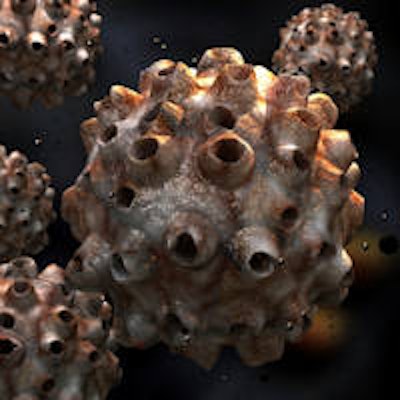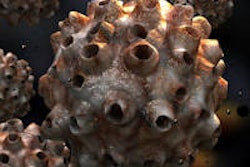
An oral rinse may be able to predict the recurrence of oropharyngeal cancer (OPC) related to human papillomavirus (HPV), according to a new study in JAMA Oncology. While from a small study, the research findings may lead to earlier detection of recurrence and also new monitoring protocols.
HPV infection is responsible for most oropharyngeal carcinomas in the U.S., the study authors noted. And studies show that the incidence of certain types of head and neck squamous cell carcinomas are increasing, especially among young adults.
 Gypsyamber D'Souza, PhD, associate professor, Johns Hopkins Bloomberg School of Public Health Department of Epidemiology. Image courtesy of Johns Hopkins Bloomberg School of Public Health.
Gypsyamber D'Souza, PhD, associate professor, Johns Hopkins Bloomberg School of Public Health Department of Epidemiology. Image courtesy of Johns Hopkins Bloomberg School of Public Health."The incidence of oropharyngeal cancer has increased significantly over the past two decades, and this increase is caused by HPV," study author Gypsyamber D'Souza, PhD, told DrBicuspid.com. "Recent research suggests this increased risk is due to generational changes in sexual behavior; i.e., people are more likely to perform oral sex -- the primary risk factor for oral HPV infection -- nowadays, and with more partners, than in previous generations." D'Souza is an associate professor in the department of epidemiology at Johns Hopkins Bloomberg School of Public Health.
Patients with HPV-positive tumors have a significantly improved prognosis, but the disease advances in as many as 25% of such cases after treatment, most within the first two years. However, even after progression, HPV-related OPC (HPV-OPC) often responds well to surgery.
"It should be reassuring that most people who have been treated for HPV-related oropharyngeal cancers are cured and there is no [HPV type 16] DNA detected in their mouths, but among those that did recur, this was an important potential predictor," D'Souza stated in a news release.
Between 35% and 45% of progressive HPV-OPCs cases have spread to distant sites at diagnosis, which decreases the usefulness of surgical treatment, according to the study authors.
HPV16 as biomarker
The biomarker of HPV type 16 (HPV16) DNA in oral exfoliated cells, which is detected in up to two-thirds of HPV-OPC cases before treatment, has been detected in some cases after treatment, studies show.
“The fact that all of the patients with persistent HPV16 DNA in their rinses after treatment later had recurrence meant that this may have the potential to become an effective prognostic tool.”
In the current study, U.S. researchers evaluated the prognostic and diagnostic implications of HPV16 DNA detection in post-treatment oral rinses in patients with HPV-OPC (JAMA Oncology, July 30, 2015).
The small, prospective study followed 124 patients from four U.S. hospitals (Johns Hopkins Hospital in Baltimore, Mount Sinai Medical System in New York City; Dana-Farber Cancer Institute in Boston, and the Oregon Health and Science University in Portland, OR) who had been diagnosed with oropharyngeal cancer from 2009 through 2013. Researchers collected oral rinses from patients at the time of diagnosis and again following treatment, as well as at nine, 12, 18, and 24 months after diagnosis. Most were married males with high incomes who never smoked.
Oral HPV16 DNA was found in the majority of the patients' oral rinses when they were diagnosed (67, 54%). Most patients no longer had HPV DNA in their oral rinse after completing treatment, but some did (5, 7%). Of these patients who did, all developed a local recurrence of the cancer.
The disease recurred within about seven months in all the patients who still had oral HPV16 DNA after their treatment. Three patients died of the disease.
New protocol
The finding, believed to be the first of its kind, could lead to new follow-up protocols for patients with oropharyngeal carcinomas, the researchers noted.
"We have demonstrated that persistent HPV16 DNA detection in post-treatment oral rinses, although infrequent, is predictive of HPV-OPC recurrence, perhaps even more so for local recurrence, and is associated with survival," the study authors concluded.
The study also revealed a clinically meaningful lead time from the positive post-treatment oral rinse to recurrence of disease (median, seven months).
"The fact that all of the patients with persistent HPV16 DNA in their rinses after treatment later had recurrence meant that this may have the potential to become an effective prognostic tool," D'Souza said.
The next step in the research includes evaluating this study's findings in other study populations to confirm whether oral HPV DNA detection at the end of therapy can predict recurrence, she said. Currently, there are no tests that have been approved by the U.S. Food and Drug Administration for detecting oral HPV DNA that can be easily used by clinicians, she noted. Findings from this study need to be developed into validated clinical tests before the oral rinse technique can be used commercially for predicting the recurrence of HPV-OPC, D'Souza said.



















